Download
in PDF Format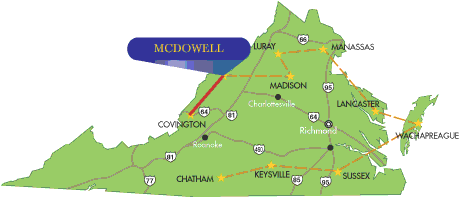
Little-changed since the days of the
Civil War battle that made this isolated mountain village famous, McDowell
today is home to an interesting mix of newcomers and locals with roots
spanning more than a century.
It is easy to miss McDowell. Passersby traveling scenic U.S. Route 250
through Highland County, Virginia�s smallest with a population of only
2,500, might note it as a sleepy village with a post office, a couple of
stores, and a smattering of well-kept historic homes.
|
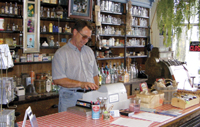
Glenn
Heatwole, who serves as chairman of the school, owns the Sugar
Tree Country Store, a landmark in McDowell. |
But there is more than meets the eye
here. Glenn and Fern Heatwole, owners of the Sugar Tree Country Store,
understand the draw of this quiet community. The couple came to Highland
County
three years ago looking for a change. Originally dairy farmers in Rockingham
County, the Heatwoles now operate one of the village�s landmark stores. �We
were looking for a place that was not as congested,� notes Glenn.
And they certainly found it in
McDowell, along with a new occupation. �We went from milking cows to
milking trees,� says Heatwole with a laugh. Today the couple, with the
help of some of their five grown children, collect sugar water from some
6,000 taps each winter to make as much as 1,200 gallons of Highland
County�s signature maple syrup. Highland
County
is one of the few places south of the
Mason-Dixon line
with a climate cold enough for producing syrup from its wealth of sugar
maple trees. The annual gathering of sugar water by local farmers can draw
as many as 60,000 visitors to the county each year for the annual Highland
Maple Festival, which celebrates its 50th year this season.
Heatwole says syrup is his
biggest-selling item and draws visitors to the county from as far away as
Holland
and
Japan. The Heatwoles also sell syrup wholesale to some 35 stores across Virginia
. Nevertheless, the Sugar Tree Country Store is unassuming with its
original potbelly stove still providing warmth to customers who can gather
around it in rocking chairs and its original shelves and counters lined
with local crafts and wares. The store was open continuously as a general
store and post office from the mid-1850s until the 1950s. It stood vacant
for some 30 years afterward until reopened as a gift shop and sugarhouse
by Jim and Lorraine White, who still live in Highland
and trained the Heatwoles in syrup making.
|
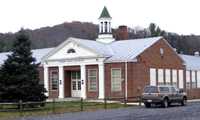
The
Stonewall Ruritan Club building houses McDowell's Highland
Christian School, a Mennonite day school that currently serves
seven students. |
Glenn Heatwole has a lot more to do
with his days than run the country store, however. He also serves as
chairman of McDowell�s Highland Christian School, a Mennonite day school
that currently serves seven students. The school is housed in the
Stonewall Ruritan Club building, appropriately enough, since the structure
once served as a county school. The Heatwoles are one among several
Mennonite families who have moved to Highland
in recent years, attracted by the community�s rural atmosphere and
slower pace. The Mennonite Church of McDowell has 24 members and is
preparing to break ground on its own church building this year.
|
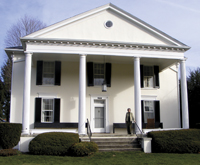
The
Obaugh Funeral Home has served McDowell since Wilma Obaugh's
father-in-law opened it in 1927. |
Newcomers like the Heatwoles rarely
have trouble finding their place in this little village, and that�s due
in large part to the friendliness of the locals. Wilma Obaugh is the
matriarch of one of McDowell�s older family lines. �My husband William
lived here all his life, and his family lived here since at least the
early 1900s,� she says. It was Mrs. Obaugh�s father-in-law who started
the first funeral services in the county in 1927. Today, Mrs. Obaugh�s
son and grandson run the Obaugh Funeral Home, a family business that has
been in existence through four generations across 80 years.
Small, delicate, and polite, Mrs.
Obaugh lives next door to the family business in a 180-year-old house
built by Peter Hull, who actually built three �mansions� in town for
his three sons. Obaugh came to McDowell from Salem
as a young bride and has lived happily in the community ever since, with
three of her four children living close by, and with grandchildren and
great-grandchildren coming and going regularly. �I like the county as a
whole,� says Obaugh. �There are such good, honest people here.�
Obaugh acknowledges, however, that
McDowell is changing, even if it looks much the same as it did 150 years
ago. Many of the old stores are gone, and more and more people are moving
into the community all the time. �I used to know everybody in the phone
book,� she explains, �but so many new people have moved in.�
Among them is Elizabeth Pyles, the new
pastor of McDowell Presbyterian Church. Pyles moved to the community just
over a year ago as a new minister. She had previously practiced law in West Virginia
for 22 years. Pyles says she never expected to end up ministering to a
small country church, but she needed a place that would accept her desire
to serve part of every year in Iraq
as part of the Christian Peacemaker Teams. �This church was able to
envision a minister working in a non-traditional way,� Pyles explains.
Pyles actually provides services to the Headwaters Chapel as well, serving
a parish of 69 members total.
Pyles doesn�t look the part of the
typical minister. Stylish, tall, and outspoken, she admits as much. �I
don�t know how many people in the congregation have the same world views
I do,� she says, �but the congregation is spiritually mature. We
don�t have to agree on everything.� Pyles has hit on the essence of what
makes life in a little place like McDowell so special. �To find a place
inhabited by people who can disagree on a variety of things and can
continue to live in a community with each other is an astonishing gift,�
she says.
|
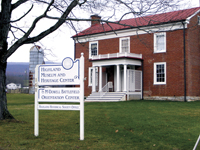
Crysta
Stanton is executive director of the Highlands Museum and Heritage
Center, which houses exhibits on local history. |
To locals, however, it�s no surprise
that people care about one another. Crysta Stanton, executive director of
the
Highland
Museum
and Heritage
Center, which houses interpretive exhibits on local history as well as the
Battle of McDowell, has seen the community pull together for causes it
cares about. One of those was the restoration of the Mansion House in
which the Highland
Museum
is housed. �Had the members of the Highland County Historical Society
not persevered, we would not have gotten to this point,� she says.
The Historical Society purchased the
Mansion House (one of those built by Peter Hull) in 2001, and spent the
better part of four years raising funds, restoring it, and turning it into
a museum and research library. Stanton
says member volunteers provided a lot of the labor. Currently, the Society
has 300 dues-paying members, about 60 percent of whom are local. Stanton
says that the little historical society logged more than 1,500 volunteer
hours last year.
The
Highland
Museum
and Heritage
Center
is often the starting point for Civil War buffs who come to McDowell to
explore the battlefield that is considered the opening of Stonewall
Jackson�s famous Valley Campaign. Here on May 8, 1862, Con�fed�erate
forces positioned on Sitlington Hill above McDowell fended off a Union
attack under Generals Robert Milroy and Robert Schenck. It was a hard-won
victory, the Confederates suffering 498 casualties compared to the
Federals� 256.
Every other year, McDowell has hosted
a re-enactment of the battle on the original battlefield, drawing
re-enactors from all over the country. However, the next Battle of
McDowell will occur in 2012 in honor of the battle�s sesquicentennial.
History is deep here, and one reason
for that is the way those who have been born and raised here make every
effort to stay if they can. Mike McCray, owner of Spruce Hill Excavating
in McDowell, has lived in the community all of his 37 years. �I was
living at home and driving back and forth to Staunton
every day, working inside and wanting to be outside,� he says. Wanting
to keep his work closer to the home he loved, he started his excavating
company eight years ago, piggybacking off his father�s previous
excavating business.
�It was the best decision I ever
made,� McCray says of running his own business in Highland. �Money is not everything. Enjoying what you do is important because
you spend more time working than doing anything else.�
McCray admits it�s not easy to stay
in Highland, however. Often, young people find it tough to make a living in this
small rural community. But McCray says the influx of newcomers is
providing a lot of opportunities for locals to build businesses here.
�We�re a service-based business, and we succeed because of newcomers
who have money to spend,� McCray explains. �I like to see traffic on
the roads and people in the stores spending money. If you can entice
someone to come here one time, chances are they�ll come again.�